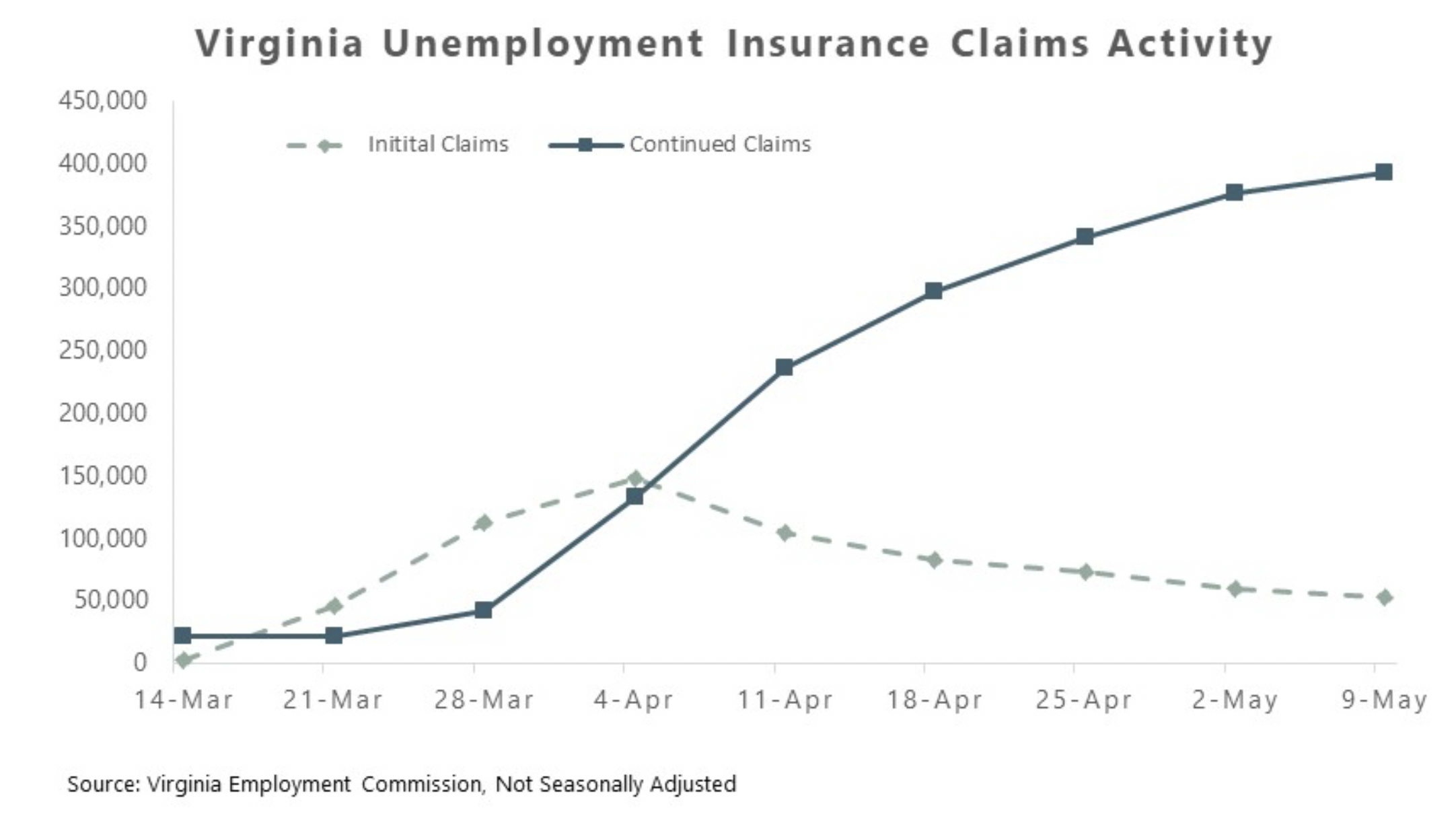Unemployment and the Housing Market: A Look at Trends in Virginia
May 21, 2020
The COVID-19 health pandemic has led to unprecedented levels of job loss and unemployment across the country. Over the past two months, more than 36 million Americans have filed for unemployment benefits. The U.S. unemployment rate hit 14.7%, the highest rate since the Great Depression. The number of people filing for unemployment each week has been steadily declining over the past month, but millions of Americans remain without jobs.
Rising unemployment impacts the housing market in at least three ways. First, and the most obvious, is that people without jobs cannot buy a home. If an individual or family was planning on a home purchase but suddenly find themselves unemployed as a result of COVID-19, they are being forced to delay that purchase. When they are able to begin their home search process again depends on how long they are unemployed and how unemployment has impacted their finances.
Second, if current homeowners experience extended unemployment and income loss, there is a chance that they will be unable to make mortgage payments. The federal government has announced mortgage forbearance programs that require services to work with borrowers to postpone—though not avoid altogether—monthly mortgage payments. However, not all borrowers will be able to avail themselves of these programs.
Third is the effect that unemployment numbers and on-going economic uncertainty have on home buyer and seller confidence. Even if their own personal financial situations are relatively secure, some individuals and families may be delaying their home search or postponing listing their home for sale.
Unemployment Trends in Virginia
Between March 21 and May 9, 2020, there have been nearly 700,000 initial claims for unemployment insurance filed in Virginia. During the week ending May 9, a total of 52,139 Virginians filed for initial unemployment benefits, which is down 12.6% compared to a week ago. The number of new people filing for unemployment benefits each week has been declining since the week ending April 4, when nearly 150,000 Virginians filed for benefits.
Initial claims are new applications for unemployment benefits. The number of continued claims provide a count of the cumulative number of Virginians who continue to be unemployed and are filing for unemployment benefits. For the week ending May 9, the continued claims total was 392,673. About two-thirds of workers who have filed for unemployment benefits during COVID-19 continued to file in the most current week.
Nearly one out of five workers filing for unemployment benefits in Virginia during the week ending May 9 were workers in the Accommodations & Food Services sector, which includes hotel, restaurant, and bar workers. 15% of new claims for unemployment benefits were from workers in the Retail Trade sector and 13% of new claims were from workers in the Health Care & Social Assistance sector.

Not surprisingly, the highest numbers of unemployed workers in Virginia are located in the State’s most populated job centers, including Fairfax and Loudoun counties in Northern Virginia, the Richmond metro area, and the City of Virginia Beach. However, these major employment centers in Virginia have also seen greater decreases in new claims for unemployment in recent weeks.
Outlook
It is expected that the unemployment rate in Virginia could reach as high as 15% this spring. Job losses will be heavily concentrated in the Accommodations & Food Services sector, though workers in all sectors of the economy will be impacted.
Many workers will return to work once the Governor’s plan for reopening Virginia is fully put into place. However, there are estimates that up to 40% of unemployed workers in Virginia will face long-term unemployment.
Despite the dramatic unemployment figures, many Virginia households have secure jobs and many are seeing their financial situations either unaffected or even higher during COVID-19. As a result, there will be buyers returning to the market when there is more certainty that the public health crisis in Virginia is on the decline. These buyers may face somewhat less competition, but there will still be relatively few choices as inventory remains low.
You might also like…
5 Key Takeaways from the NAHREP 2023 State of Hispanic Homeownership Report
By Sejal Naik - April 17, 2024
In March 2024, the National Association of Hispanic Real Estate Professionals (NAHREP) released its 2023 State of Hispanic Homeownership Report. Using data from surveys conducted by various public… Read More
3 Multifamily Market Trends from the First Quarter
By Dominique Fair - April 16, 2024
For the last three years, the multifamily market has seen high demand, double digit rent growth, and increased construction to meet demand. These trends are expected to shift… Read More
Virginia’s Housing Market Sees Largest Influx of New Listings Since 2021
By Robin Spensieri - March 29, 2024
According to the February 2024 Virginia Home Sales Report released by Virginia REALTORS®, pace in Virginia’s housing market picked up last month. There were 6,733 homes sold statewide in February,… Read More